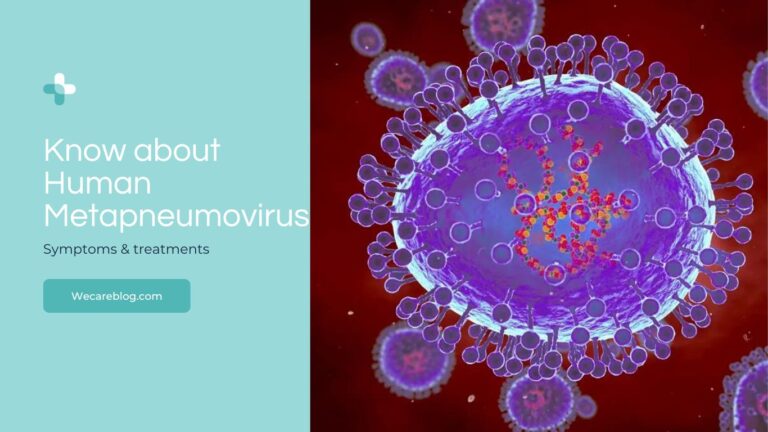Human metapneumovirus (HMPV) is a common respiratory virus that affects people of all ages, especially infants, elderly individuals, and those with weakened immune systems. Since its discovery in 2001, HMPV has been recognized as a significant cause of respiratory infections worldwide. Let's look in details about the causes, symptoms, and treatment options for human metapneumovirus infection.
Causes of Human Metapneumovirus
HMPV is a member of the family Paramyxoviridae and is related to respiratory syncytial virus (RSV). It is transmitted predominantly through respiratory droplets expelled by infected people when they cough, sneeze, or speak. The virus is capable of surviving on surfaces and in objects, allowing for indirect transmission upon contact. Schools, daycares, and nursing homes, which are crowded, increase the risk of transmission.
Symptoms of Human Metapneumovirus
The symptoms of HMPV infection are similar to those of other respiratory illnesses and may vary in severity. Common signs and symptoms include:
- Coughing, often severe
- Nasal congestion or a runny nose
- Sneezing
- Sore throat
- Fever, sometimes high
- Fatigue or malaise
- Shortness of breath or difficulty breathing
- Wheezing (more common in children)
In severe cases, HMPV infection can result in complications such as bronchiolitis or pneumonia, especially in newborns, older adults, and those with compromised immune systems.
Does hMPV have a specific remedy or vaccine?
A variety of tests, including molecular assays, viral cultures, and rapid antigen tests, may be utilized by medical personnel to diagnose HMPV infection. However, because HMPV infections are typically self-limiting, treatment focuses on symptom management and immune system support. The following treatment options may be suggested:
- Rest and hydration :
Rest and hydration are indispensable for recuperation. Drinking plenty of fluids prevents dehydration and promotes general health.
- Over-the-counter Medications:
Nonprescription pain relievers (e.g., acetaminophen) and fever reducers can alleviate symptoms including fever, hoarse throat, and headache. Particularly when administering medication to children, it is essential to adhere to the prescribed dosage and consult a healthcare professional.
- Supportive Care:
Individuals with HMPV infection who are experiencing discomfort may benefit from using a humidifier, having warm showers, or inhaling steam to relieve congestion. In addition, nasal saline drops or mists can assist in clearing the nasal passages.
- Medical Intervention:
In severe cases, infants, older adults, and those with underlying health conditions may require hospitalization. Treatments administered in hospitals may include oxygen therapy, intravenous fluids, and antiviral drugs (e.g., ribavirin). Due to limited evidence of their efficacy, antivirals are generally reserved for patients at high risk.
Is it deadly than Covid?
The answer is NO. Human metapneumovirus (HMPV) is generally not considered as severe or deadly as COVID-19. HMPV typically causes respiratory infections that are similar to the common cold or mild flu-like symptoms in most individuals. While severe cases and complications can occur, they are more common in infants, older adults, and individuals with weakened immune systems.
Prevention and Precautions
It is essential to prevent the spread of the HMPV infection. These preventive measures can aid in reducing the risk of transmission
- Hand Hygiene: In order to prevent the transmission of respiratory viruses, frequent handwashing with soap and water for at least 20 seconds or the use of alcohol-based hand sanitizers are highly effective.
- Respiratory Etiquette: When coughing or sneezing, covering the mouth and nose with a tissue or elbow can prevent the discharge of respiratory droplets into the air.
- Avoiding Close Contact: Minimizing close contact with people exhibiting respiratory symptoms, such as wheezing or sneezing, decreases the likelihood of transmission.
- Environmental Cleaning: Routine cleaning and disinfection of frequently touched surfaces and objects can reduce the virus's ability to survive and propagate.
How long does it take to recover from human metapneumovirus
The recovery time from human metapneumovirus (HMPV) infection can vary depending on several factors, including the individual's overall health, age, and the severity of the infection. In general, most people with HMPV infection experience a gradual improvement in symptoms over a period of 1 to 3 weeks. However, it's important to note that the recovery time can be longer for individuals with weakened immune systems or those who develop complications.
As we navigate the ongoing challenges posed by respiratory infections, such as hMPV, it is essential to remain informed, seek medical attention when necessary, and prioritize preventive measures to safeguard our health and the health of others.

